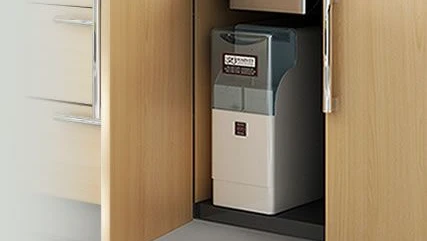Around 60% of the UK is considered to have hard to very hard water, with the south and east of England having the hardest water. Hard water is water that has calcium, minerals and magnesium dissolved into the water. A water softener removes the minerals by ion-exchange as the minerals that are responsible for the hardness can damage components of your heating system and general plumbing, as well as appliances, wherever water runs through pipes or appliances.
If you can see signs of limescale in your showers, baths on your taps… chances are you are living in a hard water region. Softening the water does not only stop damage in pipework and components but also can improve laundry brightness of clothes and leave your hair and skin feeling super soft.
List of Counties and their water hardness level
|
County |
Water Hardness Level |
|
Bedfordshire |
Hard to very hard water |
|
Berkshire |
Hard to very hard water |
|
Buckinghamshire |
Hard to very hard water |
|
Cambridgeshire |
Hard to very hard water |
|
Dorset |
Hard to very hard water |
|
Essex |
Hard to very hard water |
|
Gloucestershire |
Hard to very hard water |
|
Greater London |
Moderately hard water |
|
Hampshire |
Hard to very hard water |
|
Hertfordshire |
Hard to very hard water |
|
Kent |
Hard to very hard water |
|
Oxfordshire |
Hard to very hard water |
|
Surrey |
Hard to very hard water |
|
Sussex |
Hard to very hard water |
|
Wiltshire |
Hard to very hard water |
How much will it cost to fit a water softener?
The cost of the water softener is largely to do with which brand you choose and where in your home you would like to get the softener fitted. Also, affecting the cost of the water softener, is the size needed to supply soft water for everyone in the home's needs. Most of the cost of fitting a softener is the cost of the product, as they start from just under £1000 and some brands are well into the £1000s. Labour is just a small fraction of the cost at starting from about £250 for a few hours labour in the day for the plumber to install the water softener.
Some other types of water softeners available are non-electric (powered by incoming water pressure), metered (these are the most economical), time-clock (using a set timer to regenerate). Once the water softener is installed, the ongoing cost will be the cost of water softener salt needing to be topped up and a yearly service of the water softener. As you can see it is not just the initial cost of the water softener with labour to factor in, but the ingoing costs as well.
|
Cost to fit a water softener device |
Per |
Average cost |
|
Fit a water softener underneath kitchen sink or in a garage |
Per hour |
£250 |
|
Fit a combimate underneath kitchen sink |
Per hour |
£120 |
|
Fit an electronic scale inhibitor underneath kitchen sink |
Per day |
£80 |

What plumbing is involved with installing a water softener?
A water softener should be fitted on to the mains water supply coming into your home. It is normally housed in the cupboard underneath the kitchen sink or it can be installed out of sight in the garage or utility room. Do not install the water softener anywhere where it may freeze.
To install the water softener, the plumber will need to first turn off the mains water so that they can cut into the water supply. It is best for the plumber to install shutoff valves to isolate the water to the softener if ever that was needed. Make sure that the plumber installing the water softener follows the manufacturer’s instructions on the brand that you purchase. The water softener requires an electrical socket as well as a drain, so a kitchen sink will do for this purpose, with the drain hose being connected from the softener to the drain or utility sink.
Is it worth getting a water softener?
A water softener is a great choice for extending the life of your pipework and appliances as well as a benefit for you in the way your clothes, skin and hair will feel. It is a pricey decision when deciding to go with a water softener so do your research to make sure you choose a brand you can trust, e.g., Harvey Water Softeners and discuss with your plumber (if they know the layout of your home) so that they can advise you on what would best suit the layout and size of your home.
Benefits of a water softener are;
- Protecting pipework from getting clogged up inside
- Protecting appliances (irons, kettles, coffee machines…) from getting clogged up
- Water tastes better
- Skin and hair is left soft
- Less soap used when showering
- Less limescale left to wipe off shower screens
- Washing up leaves less scum buildup
- Clothes come out brighter and fresher looking
How often do I need to service my water softener?
Just like a boiler, most water softeners should be serviced annually by your plumber. The service will involve cleaning out the brine tank and recharging resins. They will check the valve settings to ensure that the softener is running at a pace ideal for your home set-up.
Any washers or O-rings that have deteriorated can be replaced during the service as well as check the components of the water softener to avoid any expensive repairs or leaks.